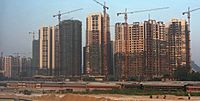
Photo from wikipedia
Abstract Against the background of the continuous development of urbanization, the urbanization process can lead to substantial changes in residential energy consumption and structures. Residential energy consumption has become the… Click to show full abstract
Abstract Against the background of the continuous development of urbanization, the urbanization process can lead to substantial changes in residential energy consumption and structures. Residential energy consumption has become the second-largest energy sector after the industrial sector. The paper studies the impact of urbanization on residential energy consumption using annual Chinese provincial data from 1996 to 2014. The results show the following. First, the impact of urbanization on residential energy consumption is heterogeneous across different per-capital income stages and urbanization stages. Second, urbanization has a positive effect on residential electricity consumption with a coefficient of 1.1 and shows heterogeneity across regions. Third, a higher urbanization rate leads to an increase in both urban and rural residential electricity consumption, with a more substantial impact on the latter. As a result, the increase in the urbanization rate contributes to shrinking the gap between urban and rural residential electricity consumption. Finally, based on the conclusions set forth above, policy implications for sustainable urbanization development under the energy constraints are given.
Journal Title: Structural Change and Economic Dynamics
Year Published: 2019
Link to full text (if available)
Share on Social Media: Sign Up to like & get
recommendations!